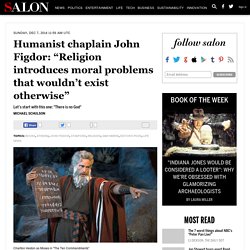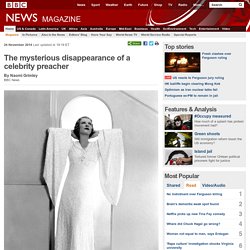

6 Things You Should Know About the Anti-Dalai Lama Protesters Few leaders of our time have achieved a popularity and reverence more universal and enduring than the Dalai Lama.

9 ways Christian zealots cripple America. Holiday season is in full swing, which means it’s time for American culture to get even more aggressively religious than usual, which is saying a lot.

Angels, Jesus, miracles, usually good TV shows coughing up saccharine episodes with morally pat endings: For those of us who aren’t big fans of syrupy religiosity, the last month of the year is hard to take, no matter how many presents you get to make up for it. There’s a lot of religious self-congratulation going on, so as a corrective, here’s a list of 9 terrible things religion has brought upon American culture. To be clear, as many religious people also have their problems with some of the excesses of Christianity in America, this is more a reminder of the problems with those excesses than some kind of slam on religious people generally. 1. War on Christmas hysteria. Avenging the Prophet Who Banned Revenges "We have avenged the Prophet Mohammad," the gunmen reportedly shouted after killing 12 at the French magazine Charlie Hebdo, Wednesday.

The publication is known for lampooning the Prophet, peace and blessings be upon him. Well. The Prophet banned revenge as he built his peace sanctuary in seventh-century Madinah, establishing instead the rule of law. Humanist chaplain John Figdor: “Religion introduces moral problems that wouldn’t exist otherwise” When students come to John Figdor, the humanist chaplain at Stanford, they’re often comfortable with their atheism.

Big questions about God aren’t necessarily on their minds. Big questions about ethics are. Is mocking religion enough? Harris, Dawkins and the future of atheist/secular politics. Right from the start, the 2012 Reason Rally in Washington, D.C., set the tone that was to dominate the rest of the day.

As the crowd was filtering in to the National Mall, a band fired up the crowd with a rousing song that lampooned the belief in “Jesus coming again,” mixing it with sexual innuendo. James Carroll on disarming the memory of Jesus: “America threatens the world with violence in ways that no other country does” Jesus died around the year 33.

Jewish angels and Roman gods: The ancient mythological origins of Christmas. Karen Armstrong on Sam Harris and Bill Maher: “It fills me with despair, because this is the sort of talk that led to the concentration camps” La oración trae sanidad cuando el cerebro se comunica con Dios, dice médico cristiano. Una encuesta reciente de EE.UU., realizada por un médico especialista cristiano, señaló que la oración tiene un efecto más positivo de lo que imaginamos, para demostrar que la fe que transmite la oración puede ofrecer una cura para muchas dolencias físicas.

El director de investigación del Instituto Thomas Jefferson Hospital and Medical College, el Dr. Andrew Newber realizó el estudio para llevar a cabo una resonancia magnética en el cerebro humano y ver que hay poder en la oración o la meditación capaz de entrenar el cerebro para funcionar bien, a partir de una relación con Dios. “Hay varias partes del cerebro que parecen estar implicados, y es realmente posible darse cuenta de que el cerebro es fácilmente propicio para moldear este tipo de proceso”, dijo Newber para explicar la capacidad del cerebro para comunicarse con Dios para una mejora física.
Al realizar las pruebas fue posible notar una gran diferencia entre el que ora y el que no lo hace. Richard Dawkins is wrong: Religion is not inherently violent. If there’s a single historical moment that captures what the author Karen Armstrong wants to convey in her new book, “Fields of Blood: Religion and the History of Violence,” it’s the Christmas-Day coronation of Charlemagne in 800.

“Pope Leo III crowned Charlemagne ‘Holy Roman Emperor’ in the Basilica of St. Peter,” she writes. “The congregation acclaimed him as ‘Augustus’ and Leo prostrated himself at Charlemagne’s feet.” If you want to blame the human race’s long, ghastly history of bloodshed on religion, Armstrong argues, be aware that faith is more often the servant than the master of politics. The mysterious disappearance of a celebrity preacher. 24 November 2014Last updated at 19:19 ET By Naomi Grimley BBC News Aimee Semple McPherson was one of the most glamorous women in the US in the 1920s.

The sick motivation behind the religious right’s Obamacare sabotage. Theology Now Baillie, Balthasar, Barth, Berdyaev, Bonhoeffer, Brunner, Bultmann--to mention only the "B-team," were coin-of-the-realm giants in the mid-20th century theological revival.

Add Niebuhr(s), Murray. Tillich and a few Liberation Theologians, and you will be mentioning the theologians that "everyone was studying. " Some are still read, but formal theology studies in graduate schools have new concerns, which demand attention. Thomas P. Why Are Millenials Unfriending Organized Religion? Intelligence officer and budding novelist John le Carré was so devastated by the Berlin Wall that he wrote ‘The Spy Who Came in from the Cold’ in a white-hot six weeks. Will religion ever disappear? Atheism is on the rise around the world, so does that mean spirituality will soon be a thing of the past? Rachel Nuwer discovers that the answer is far from simple. A growing number of people, millions worldwide, say they believe that life definitively ends at death – that there is no God, no afterlife and no divine plan. “Religiosos son menos inteligentes que los ateos”, afirma estudio provocador.
¿Las personas religiosas son menos inteligentes que los ateos? : La respuesta es sí según un nuevo estudio provocativo basado en un meta análisis de 63 estudios sobre religión e inteligencia, que abordó el siglo pasado. El meta-análisis mostró que en 53 de los estudios, realizados entre 1928 y 2012, hubo una relación inversa entre la religiosidad -tener creencias religiosas o participar en rituales religiosos- y la inteligencia. Es decir, en promedio, los incrédulos tuvieron mejores calificaciones que los religiosos en pruebas de inteligencia.
¿Cuál es la explicación para esto? : Los científicos detrás de los estudios analizados, en general sugieren que “las creencias religiosas son irracionales, no anclados en la ciencia, no comprobables y por lo tanto no es atractivo para gente inteligente que ‘no cae en eso”. Pero los investigadores que hicieron el nuevo meta-análisis dicen que la respuesta es un poco más complicada.